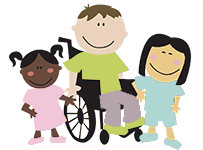[vc_row][vc_column][vc_column_text]Down Syndrome is a condition that affects the way a baby’s brain and body develop. Children with Down Syndrome have similar physical features that make them stand out from children who do not have the syndrome. In addition, they have some common health problems. These common health problems include hearing loss. Sleep apnea of the obstructive variety, vision issues, ear infections, and congenital heart defects. The condition is incurable, but speech, occupational, and physical therapy can help improve their physical and intellectual abilities. Early intervention is crucial.
 What Are the Causes?
What Are the Causes?
Down Syndrome is caused when a child is conceived with an extra chromosome known as chromosome 21. No one knows why this extra chromosome develops. We do know, however, that the extra chromosome causes the physical features and developmental problems that children with Down Syndrome have in common.
What is also known is that women who have children over age 35 are more at risk for having a child who has Down Syndrome? Statistically more children with Down Syndrome are born to women who are under 35 but it is believed that this is because there simply are more births to women over age 35.
What Are the Symptoms?
Children with Down Syndrome have similar and distinctive physical features. Some of these features are a face that appears flattened, particularly at the bridge of the nose. They have eyes that have an almond shape, but slant up. Their necks are short, their ears are small, and their tongues tend to stick out of their mouths. They are also shorter as adults and as children.
Intellectually, their IQs are generally in the low-to-moderate range and they speak more slowly than other children. Down Syndrome is the most common chromosomal condition found in the United States. Each year 1 of every 700 babies is born with Down Syndrome in the United States.
How Is It Diagnosed?
There are two types of tests used to tell if your child will have Down Syndrome; one is a screening test, the other a diagnostic test. A screening test is safe and is performed while you are pregnant. Though not definitive, it can tell you if you have a lower or higher chance of your child being born with the syndrome.
The diagnostic test is also performed during pregnancy but is riskier for the mother and the baby. They can definitively tell you if the baby has Down Syndrome, but no test can predict the level of Down Syndrome you have.
If you would like further information about Down Syndrome, please contact Speech and Occupational Therapy of North Texas. We are would be happy to help you and your child.[/vc_column_text][/vc_column][/vc_row]
